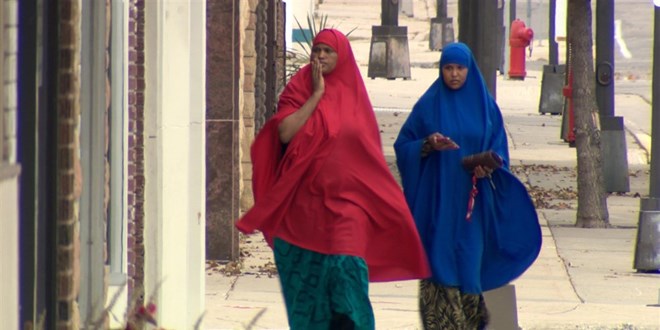
Monday May 21, 2018
by Neil Giardino

In tiny Willmar, Minnesota, more than 20 businesses in and around Main Street are Somali-owned.Ken Smith
There’s a mom and pop grocery store in Willmar, Minnesota that
carries a few items you won’t find in the freezer aisle at any Wal-Mart.
Like cubed camel meat.
“We chopped it and we weigh it. You can’t
get it anywhere except us,” said Abdilahi Omar. He’s the owner of Ainu
Shams Grocery, which also sells goat meat, ghee, and Ethiopian
flatbread.
In
recent years, the arrival of thousands of Somali immigrants from East
Africa has reshaped the Main Street in this tiny agricultural town and
many more throughout the state. These refugees are opening businesses in
once empty storefronts and introducing their customs to new customers
in places once only found in America’s inner cities, where newcomers
like these have traditionally settled upon arrival.
“If you want to know what Minnesota will look like in 20 years, go to
Willmar,” said Ken Warner, President of the town’s Chamber of Commerce.Redefining the Demographic
On
two square blocks along Litchfield Avenue, Willmar’s otherwise sleepy
main street, Somali women run errands while talking on cell phones
tucked into their hijabs and men in traditional hats called kufi sip
coffee at a local café called Bihi’s.
According
to the Minnesota State Census, the official Somali population here is
1,500 — though informal estimates put that number at over 2,000.
Combined with the city’s Latino population, the two groups now make up
close to 25 percent of Willmar’s population, which is still dominated by
farmers of Swedish and Norwegian origin.
The days of family farms
have passed here. Many of the large agribusinesses that have since
taken their place now depend on immigrant labor.
From Civil War to Jennie-O
The
first wave of Somalis came to Minnesota as refugees in the 1990s after
the outbreak of civil war in their homeland. After settling in the Twin
Cities, many moved to Willmar, where they found work at the local
Hormel-owned Jennie-O turkey processing plant.
Today
over 20 businesses in and around Main Street are Somali-owned. Many of
those have used community-based financing which complies with Islamic
law prohibiting the collection or payment of interest.
Despite
religious and cultural differences, there are many things these Somali
immigrants share with their neighbors, said Abdirizak Mahboub, a local
entrepreneur here.
“We speak the language. We are God-loving
people, you know, in our own perspective. We work hard,” said Mahboub,
56, who owns an interpreting agency that employs over 30 translators and
interpreters and has contracts with area hospitals, courts, and law
firms.

Owner
of Ainu Shams Grocery in Downtown Willmar, Abdilahi Omar, 43, plans to
expand his Somali imports grocery to a larger space.Ken Smith
On his desk, Mahboub displays photos of his two children, both of
whom grew up here and graduated from Willmar High. Without the children
of immigrants like Mahboub, Willmar’s school district would have had a
net loss of over 1,000 students in the school system. Now, the children
of Somali and Latino immigrants represent 50 percent of the district’s
population.
“That
is our future. We need to embrace the diversity that will be coming in
our future workforce,” said Aaron Backman, the director of Willmar’s
Economic Development Commission.
No
one is pretending that assimilation has come easy here. But there are
signs that Willmar’s youngest residents are embracing both cultures.
Step inside the Somali Star Restaurant and you might meet Hassan Yusuf,
the 8-year-old son of owner, Bashir. Ask him his favorite food, and he
won’t say camel meat.
“McDonald’s,” he says with a smile.
His proud father patted his boy on the head — and winced, just a little bit.